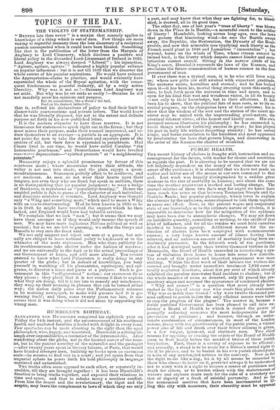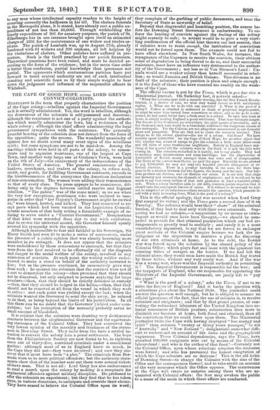PUBLIC HEALTH.
THE recent history of cholera is fraught with instruction and en- couragement for the future, with matter for shame and contrition as regards the past. It is cheering to be assured that we are not left helplessly dependent on the mercy of the elements for the arrest of the pestilence ; it is shameful that we have not made an earlier and better use of the means at our own command to that end. Last week was happily distinguished by a sudden great decrease in the rate of mortality in London; and about the same time the weather underwent a marked and lasting change. The mutual relation of these two facts may for aught we know have been much the same as that between Tenterden Steeple and the Godwin Sands; but popular philosophy, which loves to explain the obscure by the unknown, seems disposed to link them together as cause and effect. Now, in the present vague and conjectural state of our knowledge as to the intimate nature of cholera, it is impossible to determine how far the mitigation of the epidemic may have been due to atmospheric changes. We may set down an indefinite quantity, something or nothing, to the credit of that kind of influence, and for all the residue we must hold ourselves indebted to human agency. Additional means for the ex- tinction of cholera have been employed with commensurate success; a very large known amount of illness having been relieved, and an unknown amount of mortality having been un- doubtedly prevented. In the fifteenth week of the pestilence, after it had destroyed raore than twelve thousand victims in the Metropolis, the Board of Health succeeded in introducing a sys- tem of visitation from house to house into some few districts. The result of this partial and imperfect experiment was most striking. Within the first week of their labours the visiters dis- covered and brought under immediate treatment 7,819 cases of totally neglected diarrhcea, about five per cent of which already exhibited the peculiar rice-water fluid incident to cholera; but of the whole number of cases so detected, only 25 passed the pre- monitory stage and assumed the appearance of confirmed cholera.
" Why not sooner ?" is a question that must already have rushed to the lips of every one who reads this plain statement. Why was so much time wasted ? why were twelve thousand per- sons suffered to perish before the only efficient means were taken to stop the progress of the plague ? The answer is, because a feeble purblind Government has been pleased to call into ex- istence a Board of Health to which is denied the power of promptly enforcing measures the most indispensable for the prevention of pestilence ; and because, through an unfor- tunate combination of circumstances, in most of the London unions, along with the guardianship of the public purse, a virtual power also of life and death over their fellow citizens is given, to a few vulgar, ignorant, and obstinate men. Two chief reasons for opposing or evading the orders of the Board of Health seem to float hazily before the muddled brains of these parish busybodies. First, there is a saving of expense to be effected ; and secondly, a stand is to be made for a Briton's sacred right to die if he pleases, and to be buried in his own parish churchyard, in spite of any newfangled notions to the contrary. Now as for the right to die like a dog, let it by all means be conceded to those who choose to insist on it, provided always it be understood not to carry with it a right to become a source of pestilence and death for others, or to burden others with the maintenance of widows and orphans made such for the sake of a crotchety no- tion of dignity or a freak of suicidal perversity. And as for the economical motives that have been instrumental in ling this city with mourners, their absurdity must be apparent to any man whose intellectual capacity reaches to the height of counting correctly the halfpence in his till. The cholera funerals in the Metropolis alone, it is stated, have already cost a public ex- penditure of not less than 60,000/. Through withholding the timely expenditure of 30/. for sanatory purposes, the parish of St. Ethelburga has in one instance brought upon itself an estimated charge of 4201. for the maintenance of one widow and twelve or- phans. The parish of Lambeth was, up to August 27th, already burdened with 61 widows and 226 orphans, all left helpless by the visitations of cholera. Other parishes have suffered in pro- portion. Such is the thrift practised by our parish financiers. Theoretical questions have been raised, and must be decided ac- cording to the force of the evidence ; but in the mean time order is better than confusion, partial knowledge than ignorance not partial. The opponents which contumacious parishes have put forward to resist central authority are not of such intellectual standing and scientific fame as by their simple weight to bear down the judgment and influence of the responsible officers in Whitehall.



























 Previous page
Previous page